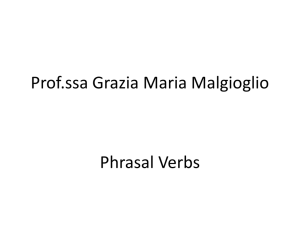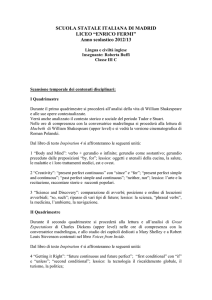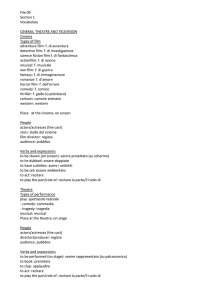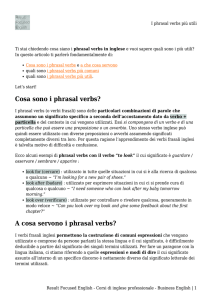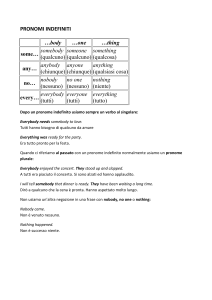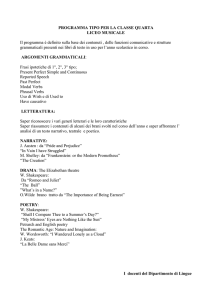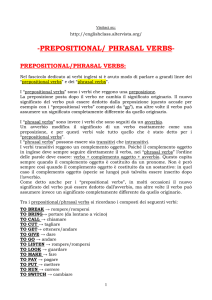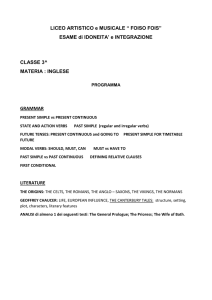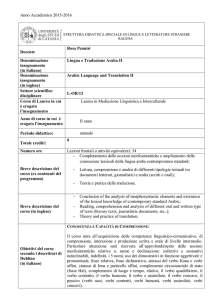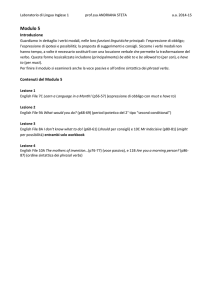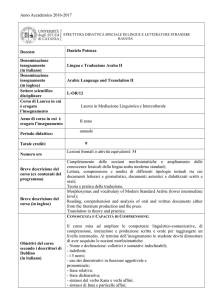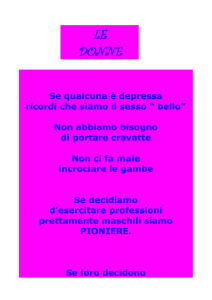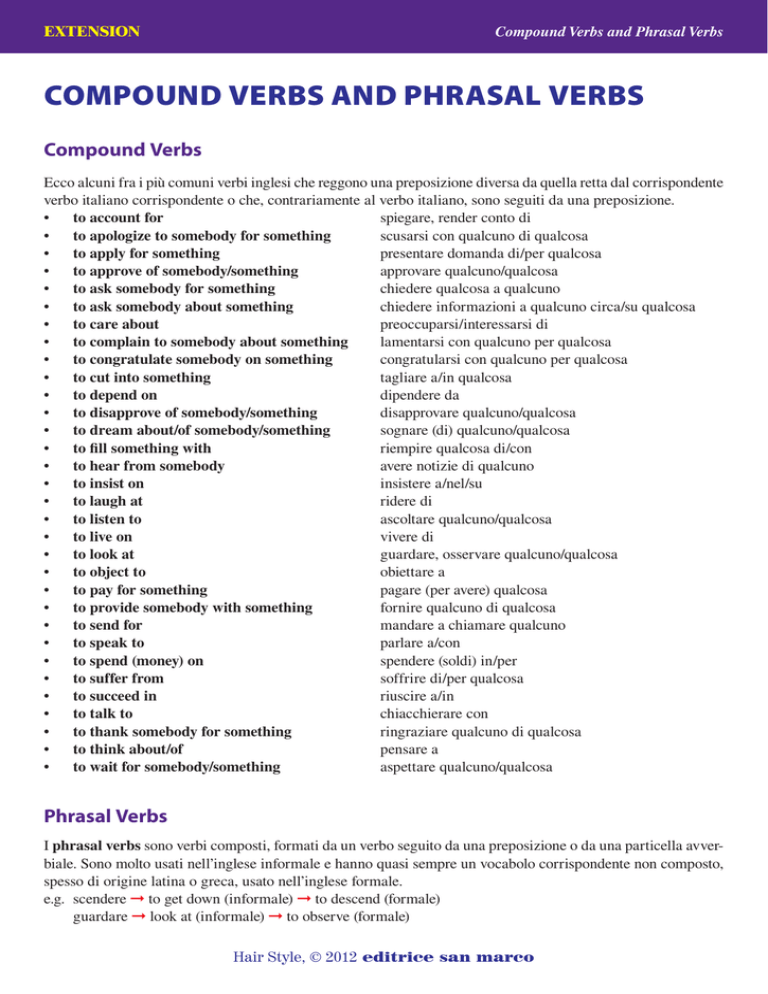
EXTENSION
Compound Verbs and Phrasal Verbs
Compound Verbs and Phrasal Verbs
Compound Verbs
Ecco alcuni fra i più comuni verbi inglesi che reggono una preposizione diversa da quella retta dal corrispondente
verbo italiano corrispondente o che, contrariamente al verbo italiano, sono seguiti da una preposizione.
• to account for spiegare, render conto di
• to apologize to somebody for something
scusarsi con qualcuno di qualcosa
• to apply for something presentare domanda di/per qualcosa
• to approve of somebody/something
approvare qualcuno/qualcosa
• to ask somebody for something
chiedere qualcosa a qualcuno
• to ask somebody about something
chiedere informazioni a qualcuno circa/su qualcosa
• to care about preoccuparsi/interessarsi di
• to complain to somebody about something
lamentarsi con qualcuno per qualcosa
• to congratulate somebody on something
congratularsi con qualcuno per qualcosa
• to cut into something
tagliare a/in qualcosa
• to depend on dipendere da
• to disapprove of somebody/something
disapprovare qualcuno/qualcosa
• to dream about/of somebody/something
sognare (di) qualcuno/qualcosa
• to fill something with riempire qualcosa di/con
• to hear from somebody avere notizie di qualcuno
• to insist on
insistere a/nel/su
• to laugh at
ridere di
• to listen to
ascoltare qualcuno/qualcosa
• to live on
vivere di
• to look at
guardare, osservare qualcuno/qualcosa
• to object to
obiettare a
• to pay for something
pagare (per avere) qualcosa
• to provide somebody with something
fornire qualcuno di qualcosa
• to send for
mandare a chiamare qualcuno
• to speak to
parlare a/con
• to spend (money) on
spendere (soldi) in/per
• to suffer from
soffrire di/per qualcosa
• to succeed in
riuscire a/in
• to talk to
chiacchierare con
• to thank somebody for something
ringraziare qualcuno di qualcosa
• to think about/of
pensare a
• to wait for somebody/something
aspettare qualcuno/qualcosa
Phrasal Verbs
I phrasal verbs sono verbi composti, formati da un verbo seguito da una preposizione o da una particella avverbiale. Sono molto usati nell’inglese informale e hanno quasi sempre un vocabolo corrispondente non composto,
spesso di origine latina o greca, usato nell’inglese formale.
e.g.scendere ➞ to get down (informale) ➞ to descend (formale)
guardare ➞ look at (informale) ➞ to observe (formale)
Hair Style, © 2012 editrice san marco
EXTENSION
Compound Verbs and Phrasal Verbs
Parecchi phrasal verbs hanno un significato idiomatico che difficilmente è possibile dedurre a partire dal verbo
originale. è opportuno dunque studiare il phrasal verb come un’unità semantica.
e.g. to brush (spazzolare)
to brush something aside (rifiutare qualcosa perché considerato poca importante)
to brush up something (migliorare le proprie conoscenze ripassando qualcosa di già studiato)
to brush someone down (richiamare qualcuno/tirare le orecchie a qualcuno)
Inoltre, quando si usa un phrasal verb, si deve fare molta attenzione all’ordine delle parole nella frase, perché la
posizione della preposizione/particella avverbiale può essere determinante per il senso.
I phrasal verbs possono essere raggruppati in 3 categorie:
1 verbo + preposizione
Il verbo è seguito da una preposizione che regge un sostantivo o un pronome.
e.g. She got off the bus. (Scese dall’autobus)
She looked at me. (Mi guardò)
2 verbo + particella avverbiale
Il phrasal verb può essere transitivo o intransitivo. Nel caso sia transitivo, il complemento oggetto può
precedere o seguire la particella avverbiale (tranne quando il complemento oggetto è un pronome e, in tal
caso, la particella avverbiale deve essere posizionata dopo). Occorre sottolineare che spesso la posizione
della particella avverbiale è regolata dall’uso più che da una precisa regola.
e.g. Put your hat on!/Put on your hat! (Mettiti il cappello!)
Put it on! (Mettitelo!) ma non Put on it!
Turn the TV on!/Turn on the TV! (Accendi il televisore)
Turn it on! (Accendilo!) ma non Turn on it!
3 verbo + particella avverbiale + preposizione
In questo caso l’ordine degli elementi che compongono la frase è fisso.
e.g. He gets on with his teacher very well. (Va molto d’accordo con la sua insegnante)
The car seems to have run out of petrol. (L’automobile sembra aver finito la benzina)
Di seguito sono riportati alcuni phrasal verbs comuni.
• to be
to be in
essere in casa
to be out
essere fuori
to be over
essere finito
to be fed up with
essere stufo di
to be up to
toccare, spettare a
• to break
to break down
guastarsi, avere un guasto
to break intoirrompere
to break outscoppiare
to break off
rompere, di solito un fidanzamento
to break up
interrompere, disperdere
• to bring
to bring aboutcausare
to bring upeducare
to bring up
sollevare un argomento
• to call
to call at
fare una fermata
to call offannullare
Hair Style, © 2012 editrice san marco
EXTENSION
•
•
•
•
•
•
•
•
•
Compound Verbs and Phrasal Verbs
to call on
far visita
to carry
to carry oncontinuare
to carry on
fare storie
to carry on withcontinuare
to carry on with
avere una relazione con
to come
to come across
trovare per caso
to cut
to cut down (on)ridurre
to cut off
rompere i rapporti con
to cut outritagliare
to get
to get awayfuggire
to get away with
farla franca
to get by
tirare avanti
to get on/intosalire
to get off/out ofscendere
to get on with fare progressi
to get up
alzarsi dal letto
to give
to give inarrendersi
to give up
rinunciare a
to go
to go in for
concorrere, partecipare, fare come hobby
to go offesplodere
to go off
andare a male
to go oncontinuare
to go out
spegnersi, di elettricità
to listen
to listen for
provare a sentire
to listen toascoltare
to look
to look after
prendersi cura di
to look atguardare
to look down ondisprezzare
to look forcercare
to look forward to
aspettare con ansia/non vedere l’ora
to look like
somigliare a
to look up
cercare, informazioni in un libro, dizionario
to look up toammirare
to make
to make for
dirigersi verso
to make outcapire
to make uptruccare
to make upinventare
to make up forrimediare
Hair Style, © 2012 editrice san marco
EXTENSION
•
•
•
•
•
•
•
•
Compound Verbs and Phrasal Verbs
to make up one’s minddecidersi
to put
to put offrinviare
to put onindossare
to put outspegnere
to put upospitare
to put up withsopportare
to run
to run afterrincorrere
to run out of
essere senza
to run over
investire, passando sopra
to take
to take afterassomigliare
to take inimbrogliare
to take off
togliere, svestirsi
to take offdecollare
to take over
prendere il controllo di
to take to
prendere in simpatia
to take up
cominciare come passatempo
to think
to think about
pensare a, considerare
to think of
pensare a, avere un’opinione di
to think overriflettere
to turn
to turn awayrespingere
to turn downrifiutare
to turn downabbassare
to turn off
chiudere, spegnere
to turn on
aprire, accendere
to turn outrisultare
to turn upalzare
to turn up
farsi vivo
to wash
to wash up
lavare i piatti
To watch
to watch out
fare attenzione
To work
to work outcalcolare
to work out at
ammontare, dopo un calcolo
Activities
1
Scegli dieci compound verbs e scrivi per ciascuno di essi una frase affermativa, quindi volgila in forma
negativa e interrogativa.
2
1
Completa le frasi in modo corretto.
I was ............ all afternoon.
Hair Style, © 2012 editrice san marco
EXTENSION
2
3
4
5
7
8
9
10
11
12
13
Compound Verbs and Phrasal Verbs
I’ll be ............ after half past five.
I’m fed ............ this heat. I hope it will rain soon.
It’s ............ you solve this problem.
When the exams are ............, I’ll go on holiday.
New cars don’t usually break ............ .
Another war seems to have broken ............ there.
Last night thieves broke ............ that house and stole all the jewels.
The police broke ............ the demonstration using tear gas.
It’s always sad to break ............ an engagement.
A long period of heat can bring ............ a lot of damage and health problems.
Her sons are very well-mannered. She’s brought them ............ very well.
This question will be brought ............ at the next meeting.
The football matche was called ............ and was not replayed.
Trains from London to Manchester call ............ Birmingham.
Let’s go and call ............ Mrs Smith.
Please carry ............ your work for a moment.
Mrs Brown has been carrying ............ that man for years!
My sister carried ............ studying despite her headache.
What’s the matter with him? Why is he carrying ............ like that?
I came ............ my old books when I was tidying out the attic.
You should cut ............ sugar, as it’s bad for your teeth.
She cut ............ several articles from the newspaper.
After the argument, his grandfather cut him ............ completely.
Her pension is just enough for her to get ............ .
The convict made a tunnel out of the prison and got ............ easily.
Children seem to get ............ anything. Nobody ever punishes them.
You can’t get ............ the train between stations.
You must get ............ the bus at the bust stop.
He’s getting ............ quite well with English.
I never get ............ before ten o’clock on Sundays.
The weather was so bad that he gave ............ the idea of going swimming.
You’re not going to win so you might as well give ............ .
A lot of people go ............ jogging or walking.
The milk went ............ overnight because I forgot to put it in the fridge.
Lights often go ............ during a thunderstorm.
Bombs often go ............ during wars.
He went ............ working, despite the noise.
I like listening ............ opera music.
Jane listened ............ her parents but there was no sound.
The babysitter had to look ............ three children.
I looked ............ my German teacher when I was at school.
What are you looking ............? My umbrella.
With his blue eyes and red hair he looked ............ his father.
Look ............ the address in the yellow pages.
It’s easy to look ............ people who ill-treat animals.
I’m looking ............ having a rest.
Don’t look ............ me! Look ............ your books!
Her writing is so bad; I can hardly make it ............ .
It’s all lies: he’s making the whole story ............ .
Hair Style, © 2012 editrice san marco
EXTENSION
14
15
16
17
18
19
20
21
Compound Verbs and Phrasal Verbs
Jane always makes ............ before going out.
She couldn’t make ............ what to wear to the party.
She took Paul to the zoo to make ............ the fact they couldn’t go to town.
When it rains, it’s best to make ............ shelter if you don’t have an umbrella.
I can put ............ a couple of friends in my spare room.
It was so cold that I put ............ two pullovers!
The game was put ............ because of fog, but was played a week later.
It’s very difficult to put ............ forest fires in summer.
It’s not easy to put ............ lazy students.
I couldn’t make an apple pie because I’d run ............ apples.
The policeman ran ............ the thief and arrested him.
The poor dog was run ............ by a lorry.
At Heathrow Airport a plane takes ............ or lands every minute during the day.
I take ............ my mother; I’m very like her in character.
I took my coat ............ indoors because it was warm.
Many people in my class have taken ............ gymnastics recently.
I was taken ............ by his smile and his kind words.
I took ............ the shop when my father retired.
It’s easy to take ............ Mrs Morgan; she’s so kind!
What do you think ............ my new shoes? They’re beautiful!
She often thought ............ what he had said.
Before she made a decision, she thought ............ his advice very carefully.
I’ll tell her as soon as she turns ............ .
It all turned ............ well in the end, despite the initial problems.
My application was turned ............ with no explanation.
My neighbours complained about the noise so I had to turn ............ my TV.
The sink is full of water. Please turn the tap ............ .
The tennis club is so full that it’s turning ............ applicants to join.
When it’s dark you must turn the lights ............ .
When the music was quiet, I turned ............ the volume of the stereo.
I hate washing ............, in fact I want to buy a dishwasher.
Watch ............ for vipers when you’re in the mountains!
Children often can’t work ............ simple sums in their head.
What does the whole bill work ............?
Hair Style, © 2012 editrice san marco

